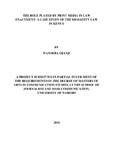| dc.description.abstract | The Biosafety Act 2009 is an Act of Parliament that regulates activities on genetically modified organisms (GMOs), facilitates responsible research and commerce in genetically modified products through a transparent science-based and predictable process.The Act is a fundamentalinstrument to comply with requirements of the Cartagena Protocol on Biosafety and safeguards Kenyans against unintended use of GMOs. This study investigated the role the print media played in the enactment of the biosafety law in Kenya. In particular, it sought to establish whether the print media fulfilled its obligation to delivering to the citizen full, complete and accurate information on, and interpretation of biotechnology, the Biosafety Bill and the process of enacting the Biosafety law. The study objectives were to: determine print media coverage of biotechnology in Kenya before the enactment of the bill; and determine the role the print media played in enacting the Biosafety Act. In order to determine the role of the print media in enacting the Biosafety Law in Kenya, this study analyzed quantitatively and qualitatively the coverage of biotechnology issues by the Nation Newspapers (Daily Nation, Saturday Nation and Sunday Nation), its sister weekly newspaper, the EastAfrican and The Standard (including Saturday and Sunday editions) over a period of 12 months from 1 November, 2006 to 30 November, 2007. Biotechnology articles were identified, counted, measured, read and categorized. The unit of observation and analysis was the published article in the papers. The articles were analyzed for prominence (area and placement), kind of story (whether hard news, features, commentary, opinion, analysis) and content of the story (balanced, fairness, and accuracy). The study reveals that the print media in Kenya contributed to the enactment of the Biosafety Act. It played a significant role in shaping public opinion and trust in biotechnology. It was instrumental in defining what the general public understands about the technology, and at the same time provided the environment by which public opinion was formed about what is oftenperceived as controversial if not contentious issue. Through the news articles, the print media served an important source of informal learning and contributed to how citizens and the legislators reached judgments about the complexities of science and technology and policy debates | en_US |

